牛津译林版九年级上册Unit 4 Growing up reading同步练习题(二)(含答案)
文档属性
| 名称 | 牛津译林版九年级上册Unit 4 Growing up reading同步练习题(二)(含答案) | 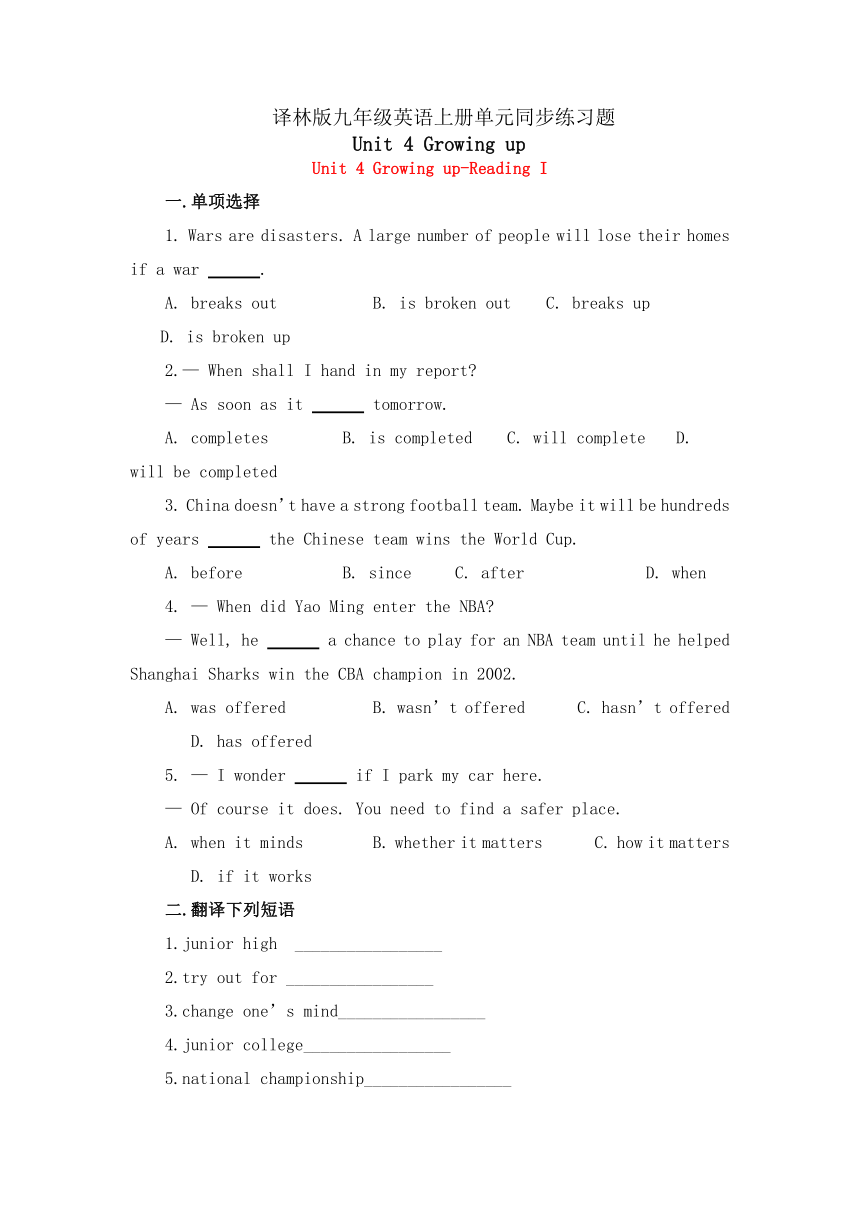 | |
| 格式 | doc | ||
| 文件大小 | 23.5KB | ||
| 资源类型 | 教案 | ||
| 版本资源 | 牛津译林版 | ||
| 科目 | 英语 | ||
| 更新时间 | 2022-12-11 17:46:24 | ||
图片预览

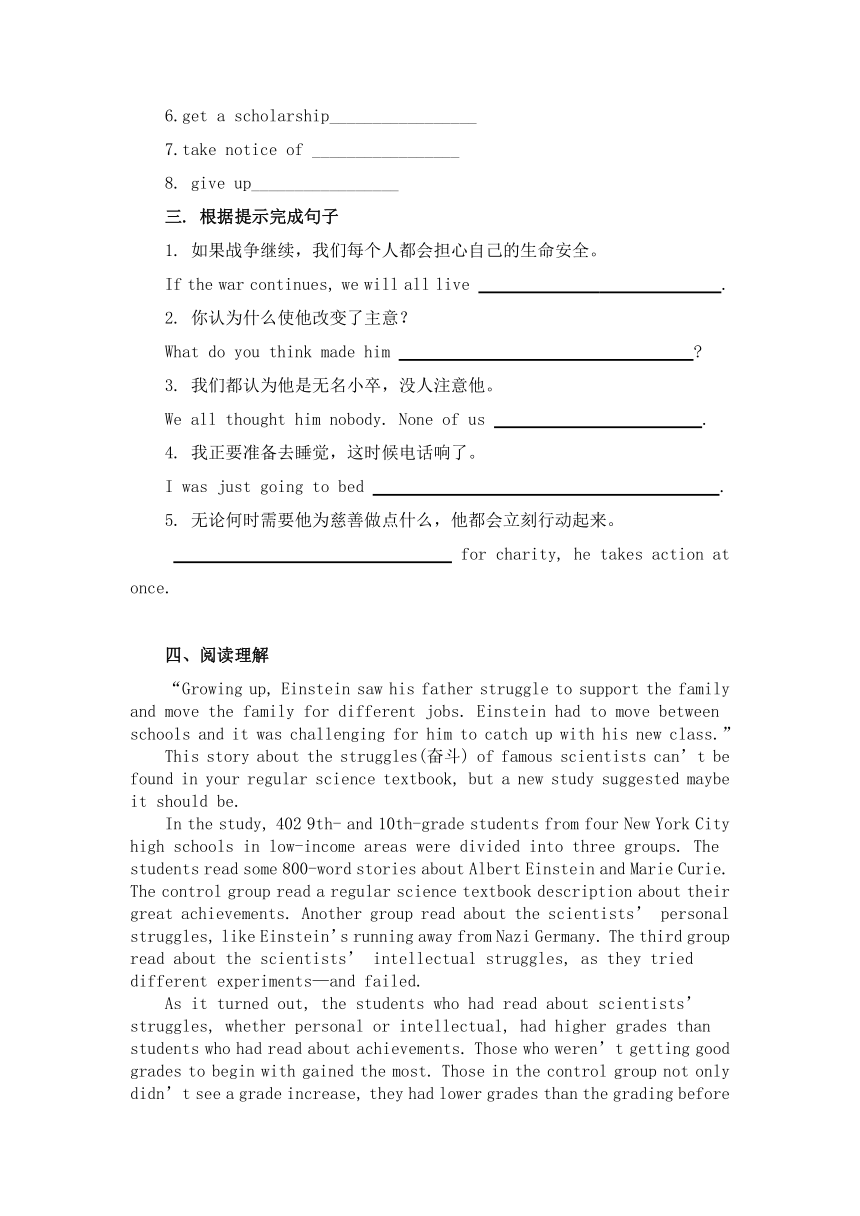
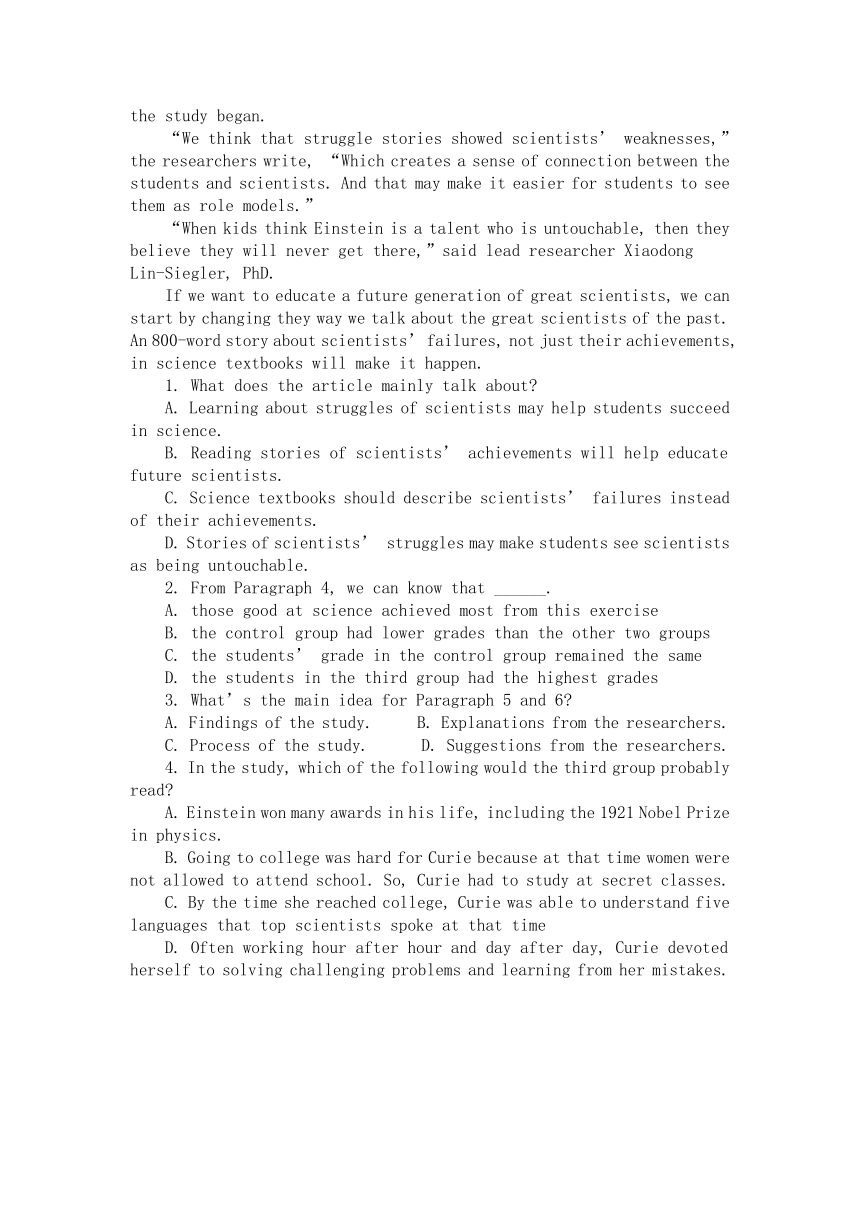
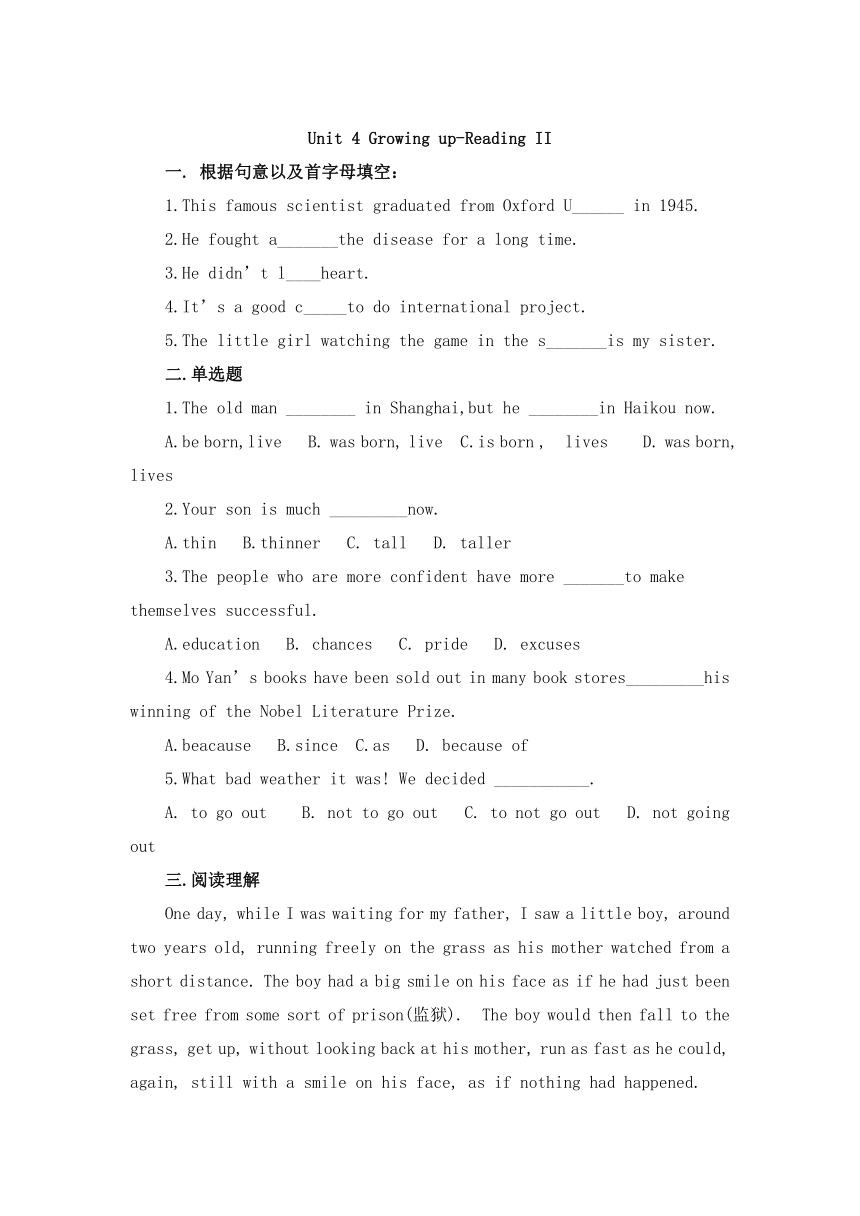
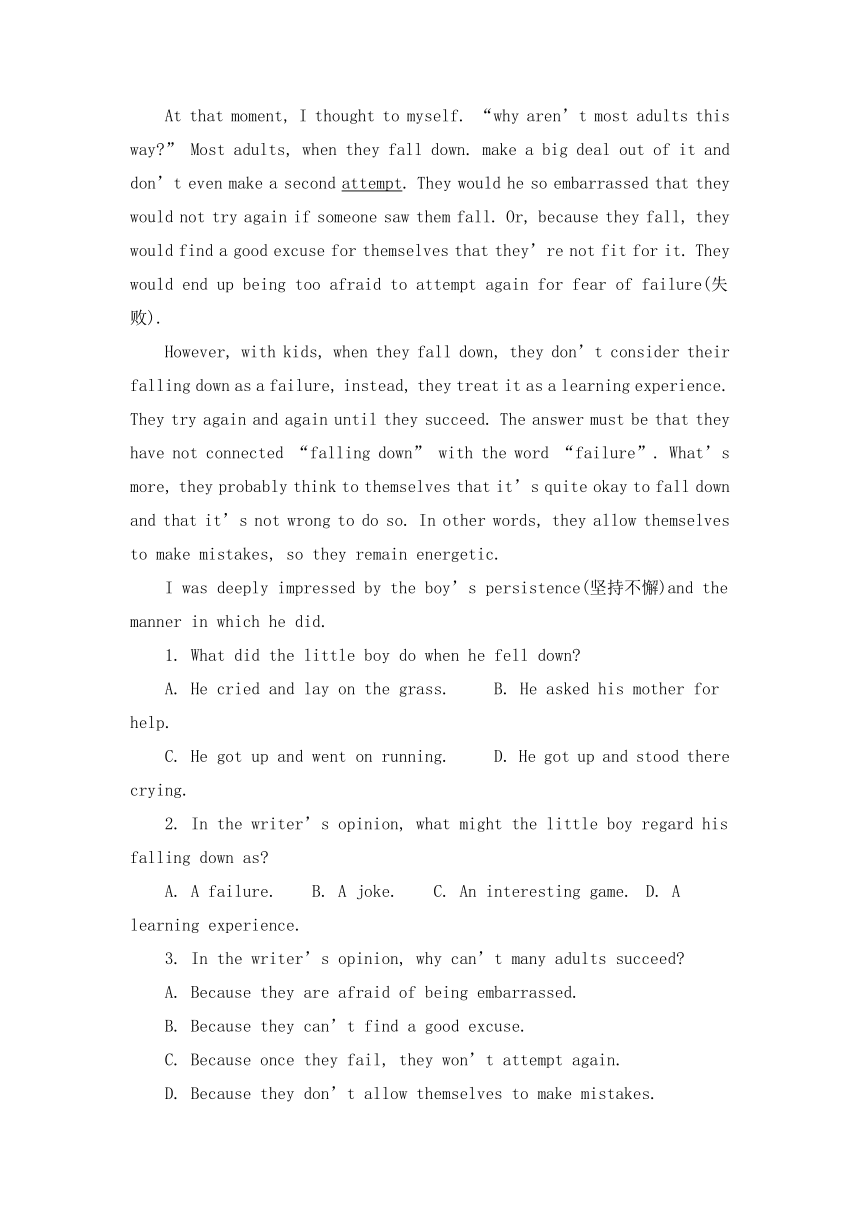
文档简介
译林版九年级英语上册单元同步练习题
Unit 4 Growing up
Unit 4 Growing up-Reading I
一.单项选择
1. Wars are disasters. A large number of people will lose their homes if a war .
A. breaks out B. is broken out C. breaks up D. is broken up
2.— When shall I hand in my report
— As soon as it tomorrow.
A. completes B. is completed C. will complete D. will be completed
3. China doesn’t have a strong football team. Maybe it will be hundreds of years the Chinese team wins the World Cup.
A. before B. since C. after D. when
4. — When did Yao Ming enter the NBA
— Well, he a chance to play for an NBA team until he helped Shanghai Sharks win the CBA champion in 2002.
A. was offered B. wasn’t offered C. hasn’t offered D. has offered
5. — I wonder if I park my car here.
— Of course it does. You need to find a safer place.
A. when it minds B. whether it matters C. how it matters D. if it works
二.翻译下列短语
1.junior high _________________
2.try out for _________________
3.change one’s mind_________________
4.junior college_________________
5.national championship_________________
6.get a scholarship_________________
7.take notice of _________________
8. give up_________________
三. 根据提示完成句子
1. 如果战争继续,我们每个人都会担心自己的生命安全。
If the war continues, we will all live .
2. 你认为什么使他改变了主意?
What do you think made him
3. 我们都认为他是无名小卒,没人注意他。
We all thought him nobody. None of us .
4. 我正要准备去睡觉,这时候电话响了。
I was just going to bed .
5. 无论何时需要他为慈善做点什么,他都会立刻行动起来。
for charity, he takes action at once.
四、阅读理解
“Growing up, Einstein saw his father struggle to support the family and move the family for different jobs. Einstein had to move between schools and it was challenging for him to catch up with his new class.”
This story about the struggles(奋斗) of famous scientists can’t be found in your regular science textbook, but a new study suggested maybe it should be.
In the study, 402 9th- and 10th-grade students from four New York City high schools in low-income areas were divided into three groups. The students read some 800-word stories about Albert Einstein and Marie Curie. The control group read a regular science textbook description about their great achievements. Another group read about the scientists’ personal struggles, like Einstein’s running away from Nazi Germany. The third group read about the scientists’ intellectual struggles, as they tried different experiments—and failed.
As it turned out, the students who had read about scientists’ struggles, whether personal or intellectual, had higher grades than students who had read about achievements. Those who weren’t getting good grades to begin with gained the most. Those in the control group not only didn’t see a grade increase, they had lower grades than the grading before the study began.
“We think that struggle stories showed scientists’ weaknesses,”the researchers write, “Which creates a sense of connection between the students and scientists. And that may make it easier for students to see them as role models.”
“When kids think Einstein is a talent who is untouchable, then they believe they will never get there,”said lead researcher Xiaodong Lin-Siegler, PhD.
If we want to educate a future generation of great scientists, we can start by changing they way we talk about the great scientists of the past. An 800-word story about scientists’ failures, not just their achievements, in science textbooks will make it happen.
1. What does the article mainly talk about
A. Learning about struggles of scientists may help students succeed in science.
B. Reading stories of scientists’ achievements will help educate future scientists.
C. Science textbooks should describe scientists’ failures instead of their achievements.
D. Stories of scientists’ struggles may make students see scientists as being untouchable.
2. From Paragraph 4, we can know that ______.
A. those good at science achieved most from this exercise
B. the control group had lower grades than the other two groups
C. the students’ grade in the control group remained the same
D. the students in the third group had the highest grades
3. What’s the main idea for Paragraph 5 and 6
A. Findings of the study. B. Explanations from the researchers.
C. Process of the study. D. Suggestions from the researchers.
4. In the study, which of the following would the third group probably read
A. Einstein won many awards in his life, including the 1921 Nobel Prize in physics.
B. Going to college was hard for Curie because at that time women were not allowed to attend school. So, Curie had to study at secret classes.
C. By the time she reached college, Curie was able to understand five languages that top scientists spoke at that time
D. Often working hour after hour and day after day, Curie devoted herself to solving challenging problems and learning from her mistakes.
Unit 4 Growing up-Reading II
一. 根据句意以及首字母填空:
1.This famous scientist graduated from Oxford U______ in 1945.
2.He fought a_______the disease for a long time.
3.He didn’t l____heart.
4.It’s a good c_____to do international project.
5.The little girl watching the game in the s_______is my sister.
二.单选题
1.The old man ________ in Shanghai,but he ________in Haikou now.
A.be born,live B. was born, live C.is born , lives D. was born, lives
2.Your son is much _________now.
A.thin B.thinner C. tall D. taller
3.The people who are more confident have more _______to make themselves successful.
A.education B. chances C. pride D. excuses
4.Mo Yan’s books have been sold out in many book stores_________his winning of the Nobel Literature Prize.
A.beacause B.since C.as D. because of
5.What bad weather it was! We decided ___________.
A. to go out B. not to go out C. to not go out D. not going out
三.阅读理解
One day, while I was waiting for my father, I saw a little boy, around two years old, running freely on the grass as his mother watched from a short distance. The boy had a big smile on his face as if he had just been set free from some sort of prison(监狱). The boy would then fall to the grass, get up, without looking back at his mother, run as fast as he could, again, still with a smile on his face, as if nothing had happened.
At that moment, I thought to myself. “why aren’t most adults this way ” Most adults, when they fall down. make a big deal out of it and don’t even make a second attempt. They would he so embarrassed that they would not try again if someone saw them fall. Or, because they fall, they would find a good excuse for themselves that they’re not fit for it. They would end up being too afraid to attempt again for fear of failure(失败).
However, with kids, when they fall down, they don’t consider their falling down as a failure, instead, they treat it as a learning experience. They try again and again until they succeed. The answer must be that they have not connected “falling down” with the word “failure”. What’s more, they probably think to themselves that it’s quite okay to fall down and that it’s not wrong to do so. In other words, they allow themselves to make mistakes, so they remain energetic.
I was deeply impressed by the boy’s persistence(坚持不懈)and the manner in which he did.
1. What did the little boy do when he fell down
A. He cried and lay on the grass. B. He asked his mother for help.
C. He got up and went on running. D. He got up and stood there crying.
2. In the writer’s opinion, what might the little boy regard his falling down as
A. A failure. B. A joke. C. An interesting game. D. A learning experience.
3. In the writer’s opinion, why can’t many adults succeed
A. Because they are afraid of being embarrassed.
B. Because they can’t find a good excuse.
C. Because once they fail, they won’t attempt again.
D. Because they don’t allow themselves to make mistakes.
4. The underlined word “attempt” in Paragraph 2 means .
A. 尝试 B. 放弃 C. 面对 D.怀疑
5. What does the writer want to tell us
A. Practice makes perfect. B. Failure is the mother of success.
C. All roads lead to Rome. D. Each coin has two sides.
Unit 4 Growing up –Task & Self assessment
一.根据句意,用括号内所给单词的适当形式填空。
1. As (lead) of the group, Andy works well with every member.
2. I think watching table tennis match is (simple) a waste of time. I have no interest in it.
3. I was just going out when a sudden (think) stopped me.
4. It’s (usual) to find diamonds (钻石) of this size.
5. In different (time) of my life, I had different dreams.
二.翻译下列句子
1.他比学校里的其他孩子要矮不少。
______________________________________________________
2.他在第一场比赛中得了20分。
______________________________________________________
3.他更加刻苦的训练,并让教练改变了主意。
______________________________________________________
4.他决定在一所两年制专科学校打球。
______________________________________________________
5.只要你永不放弃,几乎没有什么做不到。
______________________________________________________
三、完形填空
阅读下面短文,掌握大意,然后从A、B、C、D四个选项中选出最佳选项。
It does not always come easy to discover oneself. From a young age, I had a strong sense of who I was to become, 1 an accident made me redefine (重审) myself.
To me, skating was above all. There was 2 in this world that filled my heart with such joy. I spent twenty-four hours a week practicing my 3 . Having no social life or interests but skating, my devotion (挚爱) brought me first place medals in nearly every 4 .
Unfortunately, in one show, I fell down and hurt myself 5 . After several X-rays and MRI (磁共振) scans, the 6 told me that I couldn’t return to my sport any more. The pain in my hack was hard to bear and even the 7 daily tasks became difficult.
As my passion (激情) was 8 , I had little sense of who I was to become. After eight months of suffering, something had to 9 . Instead of wasting my days sitting around painfully, I began to put my 10 into local community service projects. By volunteering 11 a swimming teacher and summer reading assistant for kids, I got an idea of who I 12 to become. After a few months, I devoted time to my interest in the arts. Little by little, I 13 out of the shadow (阴影) and rebuilt my confidence.
Sometimes, some 14 rocks block (阻碍) our way. We can choose to stay behind or try to climb over. My accident was a rock that 15 to stop me from reaching success. Today I’m a very confident and optimistic person.
1. A. and B. but C. or D. so
2. A. everything B. something C. nothing D. anything
3. A. skills B. behaviors C. thoughts D. habits
4. A. meeting B. party C. concert D. competition
5. A. quickly B. softly C. badly D. slowly
6. A. waiter B. doctor C. teacher D. policeman
7. A. useful B. basic C. proper D. busy
8. A. found out B. brought back C. waken up D. taken away
9. A. change B. remain C. leave D. arrive
10. A. energy B. duty C. wealth D. spirit
11. A. with B. for C. as D. to
12. A. wanted B. started C. promised D. lived
13. A. ran B. jumped C. stood D. stepped
14. A. small B. large C. ugly D. round
15. A. managed B. helped C. failed D. continued
参考答案
一. ABABB
二.1.初中 2.选拔 3.改变主意 4.专科学校 5.全国锦标赛
6.获得奖学金 7.注意 8.放弃
三. 1. in fear of our lives
2. change his mind
3. took notice of him
4. when the telephone rang
5. Whenever he is needed to do something
参考答案
一:1.university 2.against 3.lose 4.chance 5.stand
二. BBDBD
三. CDCAB
参考答案
一. 1.leader 2.simply 3.thinking 4. unusual 5.times
二.
1.He was much smaller than the other kids at school.
2.He got 20points in his first game.
3.He practiced much harder and got the coach change his mind.
4.He decided to play at a junior college.
5.You can do almost anything if you never give up.
三. 1-5 BCADC 6-10 BBDAA 11-15 CADBC
Unit 4 Growing up
Unit 4 Growing up-Reading I
一.单项选择
1. Wars are disasters. A large number of people will lose their homes if a war .
A. breaks out B. is broken out C. breaks up D. is broken up
2.— When shall I hand in my report
— As soon as it tomorrow.
A. completes B. is completed C. will complete D. will be completed
3. China doesn’t have a strong football team. Maybe it will be hundreds of years the Chinese team wins the World Cup.
A. before B. since C. after D. when
4. — When did Yao Ming enter the NBA
— Well, he a chance to play for an NBA team until he helped Shanghai Sharks win the CBA champion in 2002.
A. was offered B. wasn’t offered C. hasn’t offered D. has offered
5. — I wonder if I park my car here.
— Of course it does. You need to find a safer place.
A. when it minds B. whether it matters C. how it matters D. if it works
二.翻译下列短语
1.junior high _________________
2.try out for _________________
3.change one’s mind_________________
4.junior college_________________
5.national championship_________________
6.get a scholarship_________________
7.take notice of _________________
8. give up_________________
三. 根据提示完成句子
1. 如果战争继续,我们每个人都会担心自己的生命安全。
If the war continues, we will all live .
2. 你认为什么使他改变了主意?
What do you think made him
3. 我们都认为他是无名小卒,没人注意他。
We all thought him nobody. None of us .
4. 我正要准备去睡觉,这时候电话响了。
I was just going to bed .
5. 无论何时需要他为慈善做点什么,他都会立刻行动起来。
for charity, he takes action at once.
四、阅读理解
“Growing up, Einstein saw his father struggle to support the family and move the family for different jobs. Einstein had to move between schools and it was challenging for him to catch up with his new class.”
This story about the struggles(奋斗) of famous scientists can’t be found in your regular science textbook, but a new study suggested maybe it should be.
In the study, 402 9th- and 10th-grade students from four New York City high schools in low-income areas were divided into three groups. The students read some 800-word stories about Albert Einstein and Marie Curie. The control group read a regular science textbook description about their great achievements. Another group read about the scientists’ personal struggles, like Einstein’s running away from Nazi Germany. The third group read about the scientists’ intellectual struggles, as they tried different experiments—and failed.
As it turned out, the students who had read about scientists’ struggles, whether personal or intellectual, had higher grades than students who had read about achievements. Those who weren’t getting good grades to begin with gained the most. Those in the control group not only didn’t see a grade increase, they had lower grades than the grading before the study began.
“We think that struggle stories showed scientists’ weaknesses,”the researchers write, “Which creates a sense of connection between the students and scientists. And that may make it easier for students to see them as role models.”
“When kids think Einstein is a talent who is untouchable, then they believe they will never get there,”said lead researcher Xiaodong Lin-Siegler, PhD.
If we want to educate a future generation of great scientists, we can start by changing they way we talk about the great scientists of the past. An 800-word story about scientists’ failures, not just their achievements, in science textbooks will make it happen.
1. What does the article mainly talk about
A. Learning about struggles of scientists may help students succeed in science.
B. Reading stories of scientists’ achievements will help educate future scientists.
C. Science textbooks should describe scientists’ failures instead of their achievements.
D. Stories of scientists’ struggles may make students see scientists as being untouchable.
2. From Paragraph 4, we can know that ______.
A. those good at science achieved most from this exercise
B. the control group had lower grades than the other two groups
C. the students’ grade in the control group remained the same
D. the students in the third group had the highest grades
3. What’s the main idea for Paragraph 5 and 6
A. Findings of the study. B. Explanations from the researchers.
C. Process of the study. D. Suggestions from the researchers.
4. In the study, which of the following would the third group probably read
A. Einstein won many awards in his life, including the 1921 Nobel Prize in physics.
B. Going to college was hard for Curie because at that time women were not allowed to attend school. So, Curie had to study at secret classes.
C. By the time she reached college, Curie was able to understand five languages that top scientists spoke at that time
D. Often working hour after hour and day after day, Curie devoted herself to solving challenging problems and learning from her mistakes.
Unit 4 Growing up-Reading II
一. 根据句意以及首字母填空:
1.This famous scientist graduated from Oxford U______ in 1945.
2.He fought a_______the disease for a long time.
3.He didn’t l____heart.
4.It’s a good c_____to do international project.
5.The little girl watching the game in the s_______is my sister.
二.单选题
1.The old man ________ in Shanghai,but he ________in Haikou now.
A.be born,live B. was born, live C.is born , lives D. was born, lives
2.Your son is much _________now.
A.thin B.thinner C. tall D. taller
3.The people who are more confident have more _______to make themselves successful.
A.education B. chances C. pride D. excuses
4.Mo Yan’s books have been sold out in many book stores_________his winning of the Nobel Literature Prize.
A.beacause B.since C.as D. because of
5.What bad weather it was! We decided ___________.
A. to go out B. not to go out C. to not go out D. not going out
三.阅读理解
One day, while I was waiting for my father, I saw a little boy, around two years old, running freely on the grass as his mother watched from a short distance. The boy had a big smile on his face as if he had just been set free from some sort of prison(监狱). The boy would then fall to the grass, get up, without looking back at his mother, run as fast as he could, again, still with a smile on his face, as if nothing had happened.
At that moment, I thought to myself. “why aren’t most adults this way ” Most adults, when they fall down. make a big deal out of it and don’t even make a second attempt. They would he so embarrassed that they would not try again if someone saw them fall. Or, because they fall, they would find a good excuse for themselves that they’re not fit for it. They would end up being too afraid to attempt again for fear of failure(失败).
However, with kids, when they fall down, they don’t consider their falling down as a failure, instead, they treat it as a learning experience. They try again and again until they succeed. The answer must be that they have not connected “falling down” with the word “failure”. What’s more, they probably think to themselves that it’s quite okay to fall down and that it’s not wrong to do so. In other words, they allow themselves to make mistakes, so they remain energetic.
I was deeply impressed by the boy’s persistence(坚持不懈)and the manner in which he did.
1. What did the little boy do when he fell down
A. He cried and lay on the grass. B. He asked his mother for help.
C. He got up and went on running. D. He got up and stood there crying.
2. In the writer’s opinion, what might the little boy regard his falling down as
A. A failure. B. A joke. C. An interesting game. D. A learning experience.
3. In the writer’s opinion, why can’t many adults succeed
A. Because they are afraid of being embarrassed.
B. Because they can’t find a good excuse.
C. Because once they fail, they won’t attempt again.
D. Because they don’t allow themselves to make mistakes.
4. The underlined word “attempt” in Paragraph 2 means .
A. 尝试 B. 放弃 C. 面对 D.怀疑
5. What does the writer want to tell us
A. Practice makes perfect. B. Failure is the mother of success.
C. All roads lead to Rome. D. Each coin has two sides.
Unit 4 Growing up –Task & Self assessment
一.根据句意,用括号内所给单词的适当形式填空。
1. As (lead) of the group, Andy works well with every member.
2. I think watching table tennis match is (simple) a waste of time. I have no interest in it.
3. I was just going out when a sudden (think) stopped me.
4. It’s (usual) to find diamonds (钻石) of this size.
5. In different (time) of my life, I had different dreams.
二.翻译下列句子
1.他比学校里的其他孩子要矮不少。
______________________________________________________
2.他在第一场比赛中得了20分。
______________________________________________________
3.他更加刻苦的训练,并让教练改变了主意。
______________________________________________________
4.他决定在一所两年制专科学校打球。
______________________________________________________
5.只要你永不放弃,几乎没有什么做不到。
______________________________________________________
三、完形填空
阅读下面短文,掌握大意,然后从A、B、C、D四个选项中选出最佳选项。
It does not always come easy to discover oneself. From a young age, I had a strong sense of who I was to become, 1 an accident made me redefine (重审) myself.
To me, skating was above all. There was 2 in this world that filled my heart with such joy. I spent twenty-four hours a week practicing my 3 . Having no social life or interests but skating, my devotion (挚爱) brought me first place medals in nearly every 4 .
Unfortunately, in one show, I fell down and hurt myself 5 . After several X-rays and MRI (磁共振) scans, the 6 told me that I couldn’t return to my sport any more. The pain in my hack was hard to bear and even the 7 daily tasks became difficult.
As my passion (激情) was 8 , I had little sense of who I was to become. After eight months of suffering, something had to 9 . Instead of wasting my days sitting around painfully, I began to put my 10 into local community service projects. By volunteering 11 a swimming teacher and summer reading assistant for kids, I got an idea of who I 12 to become. After a few months, I devoted time to my interest in the arts. Little by little, I 13 out of the shadow (阴影) and rebuilt my confidence.
Sometimes, some 14 rocks block (阻碍) our way. We can choose to stay behind or try to climb over. My accident was a rock that 15 to stop me from reaching success. Today I’m a very confident and optimistic person.
1. A. and B. but C. or D. so
2. A. everything B. something C. nothing D. anything
3. A. skills B. behaviors C. thoughts D. habits
4. A. meeting B. party C. concert D. competition
5. A. quickly B. softly C. badly D. slowly
6. A. waiter B. doctor C. teacher D. policeman
7. A. useful B. basic C. proper D. busy
8. A. found out B. brought back C. waken up D. taken away
9. A. change B. remain C. leave D. arrive
10. A. energy B. duty C. wealth D. spirit
11. A. with B. for C. as D. to
12. A. wanted B. started C. promised D. lived
13. A. ran B. jumped C. stood D. stepped
14. A. small B. large C. ugly D. round
15. A. managed B. helped C. failed D. continued
参考答案
一. ABABB
二.1.初中 2.选拔 3.改变主意 4.专科学校 5.全国锦标赛
6.获得奖学金 7.注意 8.放弃
三. 1. in fear of our lives
2. change his mind
3. took notice of him
4. when the telephone rang
5. Whenever he is needed to do something
参考答案
一:1.university 2.against 3.lose 4.chance 5.stand
二. BBDBD
三. CDCAB
参考答案
一. 1.leader 2.simply 3.thinking 4. unusual 5.times
二.
1.He was much smaller than the other kids at school.
2.He got 20points in his first game.
3.He practiced much harder and got the coach change his mind.
4.He decided to play at a junior college.
5.You can do almost anything if you never give up.
三. 1-5 BCADC 6-10 BBDAA 11-15 CADBC
